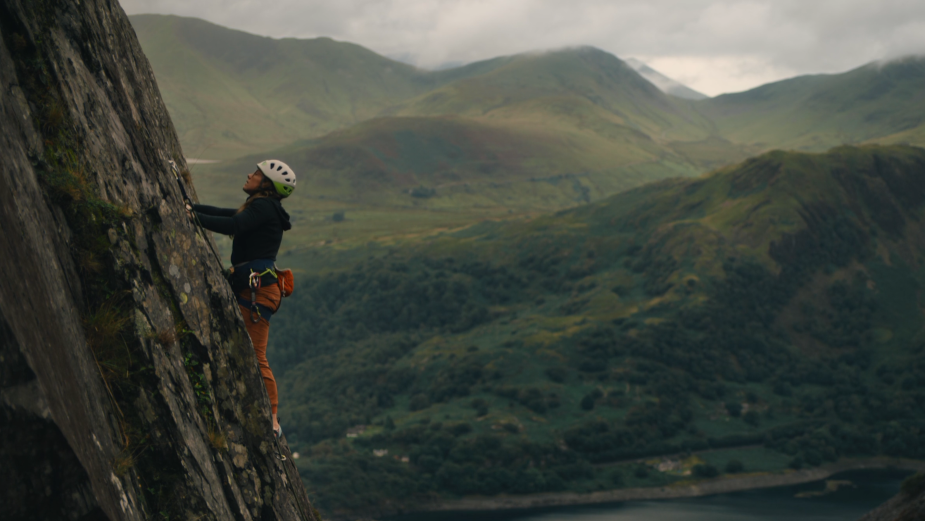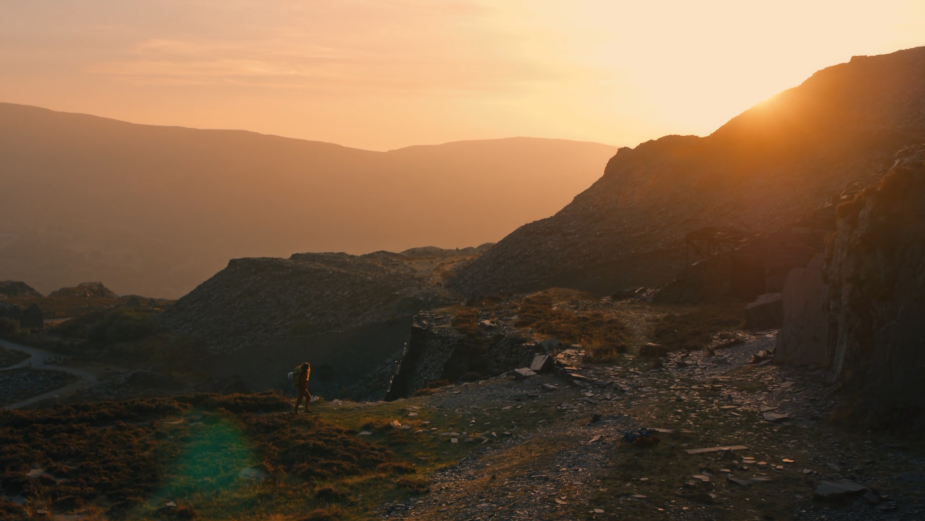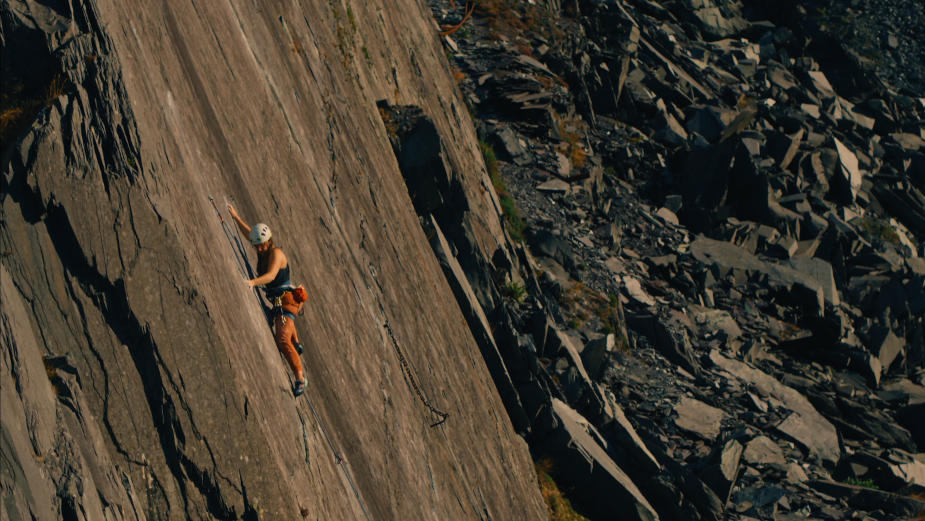
LBB Film Club: RISE

When diagnosed with a Functional Neurological Disorder, both your mind and body experience episodic losses of control - this means collapsing and being subject to seizures. Delyth Owen was diagnosed in 2017.
As you can imagine, the day-to-day challenges Delyth faces are unrivalled, with what she can only describe as ‘a loss of control’ taking over and changing who she is. But ever-persistent, Delyth uses the rugged, Welsh landscape to her advantage. As a climber, she works in unison with the grooves of quarry walls to regain her sense of control and revel in the breathtaking views which greet her at the top of her climb.
In this film, as we hear Delyth’s story, we are presented with close-up, panoramic and drone imagery of the serene and unforgiving landscape of a Welsh quarry. Stunning shots are accompanied by sound that builds tension and atmosphere, accompanied by colour grade that blends in seamlessly with the backdrop of sheer, rugged quarry faces which Delyth uses as a point of reconnection within her day-to-day life.
The short film’s director Chris Thomas, Cheat’s colourist Vlad Barin and Factory’s sound designer Michael Haines, speak to LBB’s Nisna Mahtani about the film.
LBB> How did you hear Delyth’s story and why did she become the inspiration for this project?
Chris> I came into contact with Delyth through a climbing Facebook group. Over Zoom, she spoke to me about her experiences with a functional neurological disorder, which at that point I had never heard of before. Delyth went on to tell me that she regularly climbs a local quarry to allow herself not only to continue to do something she’s incredibly passionate about, but to use climbing to mentally and physically strengthen, and to not allow this condition to define who she is. For me, as someone who’s interested in spending time outdoors, I’ve always been fascinated with the force that drives us upwards and people’s connections and experiences with various terrain.
LBB> What was the overall feeling you wanted to convey in this short film?
Chris> Rise is an atmospheric portrait piece with the feeling of hope that increases as we journey to the top of the quarry. This is very much a story about tenacity and desire.
LBB> Talk us through the scriptwriting process, how it evolved and how many re-writes it went through before you landed on the final piece that we hear narrated?
Chris> Conceptually, the film has quite a simple narrative structure. The pacing of the storytelling was important as it represents the longevity of the ascent but also allows the visuals to really breathe and encapsulate.
The voiceover is noted and interpreted from conversations between myself and Delyth, so it was just a case of selecting what worked and evoked a certain feeling. The main thing for me was not overloading the film with too much VO. Sometimes there’s more to be said visually.

LBB> You include some beautifully scenic and panoramic shots of the Welsh quarry and landscape. How did this contribute to the overall storytelling of the piece?
Chris> The landscape in North Wales is very unique and particularly the areas of slate. This is the second film I’ve shot at the quarry and there’s never an end to the sense of awe.
I wanted to draw on the deeper parallels between Delyth through the unspoken voice of the landscape and to present a visual representation of her inner psychological struggle. The fragility of the terrain, the ever-changing atmosphere, the scale and ascents one must commit to, to reach the top.
LBB> With the windy and wet Welsh weather, can you talk us through the process of capturing moments of sunshine? And how long did it take before you were able to get these shots?
Chris> As in the film, the weather systems can be very fast-moving in Snowdonia, so forecasting was something we had to consider at all times. I’m a bit of a weather nerd, so with the use of weather models and luck on our side, we managed to utilise certain conditions for different scenes of the film.
A lot of people have asked about the shot where the sun comes out and lights up one side of the quarry. We just so happened to see an opening in the clouds and snatched that shot in the moment.
LBB> Cheat worked on the colour grading of the piece. What was the overall aim of the grade and how were the colour changes weaved so seamlessly into the storyline?
Vlad> We separated the story into two worlds - the first half of her journey and the climbing sequence. For the opening, we had the liberty to be a bit off from reality, applying dreamy pastel warmer tones which then immediately contrasted with cooler tones when Delyth woke up.
As Delyth makes her way to the quarry, we wanted the scenes to feel dark and moody. We went for quite a strong blue tint, enhanced a lot of the rock formations and separated little pops of colour from vegetation and wildflowers as well as her climbing outfit.
For the final climbing section, we returned to an ethereal look but kept the image looking more natural than the start, to enhance the positivity and hopefulness of the story.

LBB> Factory also designed the sound in the film, which starts very naturally and builds to a triumphant crescendo as Delyth reaches the top of her climb. What was the initial idea for sound in the piece and how did it evolve?
Michael> Our initial idea for the sound was to create a soundscape that mimics the unpredictable nature of the Welsh weather. We really wanted to feel it and give a sense of how ominous the environment can be. As we progress through the film, we learn that there are times of peace and immense beauty dotted between periods of storms and heavy winds. It is within this relationship that the sound design evolved to become a reflection of Delyth's mental journey. It tells us that, although Functional Neurological Disorder makes Delyth's life tough, climbing and taming the rugged landscape provides her with strength and solace.
Chris> Tom Player, who scored the film, brought another layer to the storytelling. The music beautifully guides us through the narrative, starting quite atmospheric which then builds and rises as we move into the climbing sequence. There’s a wonderful shift in the music when Delyth walks through the cave, a sense of ambition and energy that lifts us to the very end.
LBB> While shooting, were there any shots that you knew had to make it into the final edit?
Chris> As I mentioned previously, probably the shot of the sun coming out and also some of the drone shots of Delyth walking up the steep inclines. A couple of the frames on their own represent everything that the film is about. Working with Lee Thomas (DoP) and Ben Hoy-Slot (drone operator) is always a joy, always trying to use the drone in ways that serve the story.
LBB> What has the reception to the film been like so far?
Chris> It’s been really great (to my face anyway) but what’s lovely is, I feel the story has connected and reached people in different ways. It’s a story that I think speaks true and relates to many other people’s experiences. The film has been accepted into a couple of prestigious film festivals (unannounced) so we hope to push that even further this year.
LBB> Would you like to share anything else with us?
Chris> Thank you so much to everyone who worked on the film and to Delyth for trusting me with her story.












